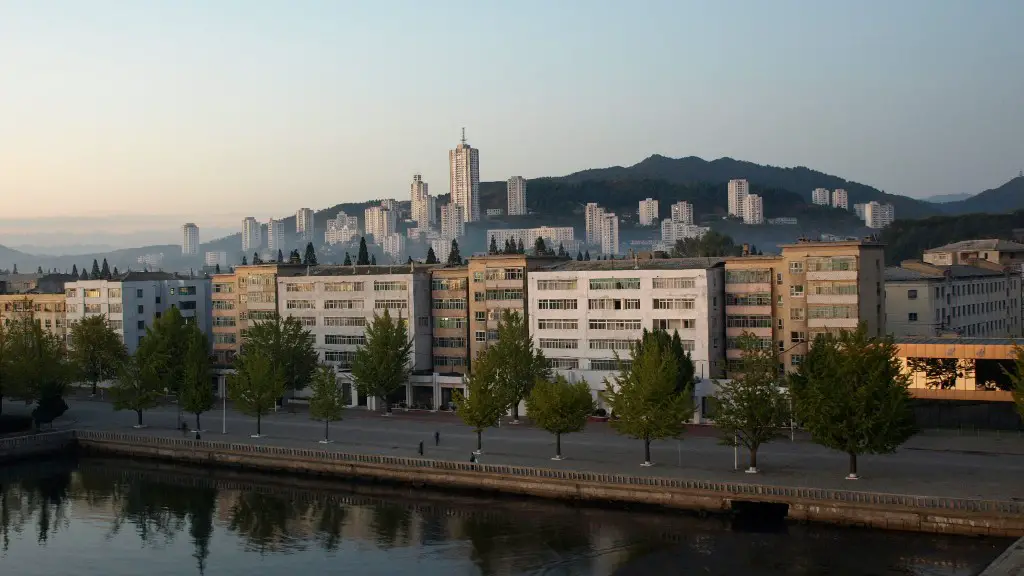Why Is North Korea So Important?
North Korea has become one of the most contentious and debated nations in the world in recent years. Its military and nuclear capabilities, its leadership, and its government policies have all become topics of debate in the news media, international relations, and political discourse.
The nation of North Korea is located in northeastern Asia between China and South Korea. It is a totalitarian state with a hereditary monarchy that controls every aspect of the country and its citizens’ lives. Its leaders have been heavily criticized for their human rights abuses, military adventures, nuclear weapons program, and isolationist policies.
North Korea has long been a major player in international affairs due to its geographic proximity to both the United States and China. Its border with South Korea has been one of the most militarized and heavily guarded in the world for decades. In addition, North Korea’s nuclear weapons program has caused international alarm for many years.
North Korea has also been a thorn in the side of the United States-led international community since the end of World War II. Its leaders have refused to abide by United Nations Security Council resolutions, pursued aggressive military postures, and repeatedly engaged in provocations against the United States and its allies.
North Korea is also a major cause of concern for many nations in East Asia due to the potential threat posed by the nation’s nuclear program. North Korea has conducted several underground nuclear tests and has the technical capability to build nuclear weapons. Its leaders have repeatedly threatened to use these weapons in an effort to disrupt the peace in the region.
North Korea can also potentially disrupt the economic stability of the region due to its reliance on imports and exports to sustain its economy. Its strict control of its borders and restrictions on foreign trade has resulted in an economic isolation that has negatively impacted many of the countries in the region, including South Korea and Japan.
Finally, North Korea’s long-standing hostility to the international community and its provocative behavior has made it a major focus of global attention. Its unusual foreign policy and leadership make it a source of intrigue and a potential flashpoint for international tensions.
The Relationship between North Korea and the US
The relationship between North Korea and the United States has been fraught with tension and distrust for many years, leading to a series of international incidents ranging from arms embargoes to economic sanctions. In recent years, the US has maintained a policy of diplomatic engagement with North Korea in an effort to deescalate tensions and promote regional peace and stability.
The US has consistently sought to persuade North Korea to abandon its nuclear weapons program and has imposed a series of economic sanctions in an effort to pressure North Korea to comply. Recently, the Trump administration has sought to engage in direct talks with North Korea in an effort to negotiate a deal for denuclearization.
Despite these efforts, North Korea has repeatedly resisted US pressure and provocations and has continued to pursue its nuclear weapons program in defiance of the United States and international community. The nation’s leadership has been repeatedly accused of human rights abuses and has been linked to a number of illicit activities, including cyber-espionage and money laundering.
At present, the relationship between North Korea and the United States remains strained. The two nations have engaged in several high-profile disputes, and there are no signs that this trend is likely to reverse in the near future.
North Korea’s Role in the International System
As one of the few remaining authoritarian countries, North Korea has an outsized role in the international system. Its nuclear weapons program and provocative rhetoric have made it a major security concern for the international community and a source of tension in the region. In addition, North Korea’s domestic policies, including its human rights abuses, have attracted the attention of human rights organizations.
North Korea is also a major force in the international economy. Its imports and exports are an important component of the global supply chain, and its isolation from the rest of the world makes it an attractive destination for foreign investments and business opportunities.
Finally, North Korea’s unique political system makes it a source of fascination for many scholars and analysts. Its government and leadership style have been the subject of much academic and political debate, and its behavior has presented a challenge to the international order.
North Korea’s Impact on the Region
The state of North Korea has had a significant impact on its regional neighbors, both in terms of security and economics. Its nuclear weapons program has been a source of concern for many of its neighbors as they seek to contain the security threat posed by North Korea’s weapons.
In addition, North Korea’s economic isolation has had an economic impact on the region. Its dependence on imports and exports to sustain its economy has made it an attractive destination for trade and investment. North Korea’s decision to engage in foreign trade has also had an impact on the economies of its neighboring countries.
Finally, North Korea’s leadership style has been a source of concern for many of its neighbors. Its authoritarian rule and absolute control has led to a host of human rights abuses against its citizens and a state of near-constant repression. This has caused tension in the region as its neighbors seek to promote human rights and democracy in the area.
Conclusion
North Korea is a major player in the international community due to its strategic location, its nuclear weapons program, and its unpredictable leadership. Its economic policies and military postures have caused tension in the region, and its leadership has been repeatedly accused of human rights abuses and other illicit activities. The nation’s impact on the region and the international system is significant, and its relationship with the United States and other nations remains a source of international tension.




